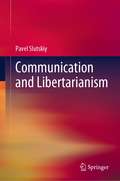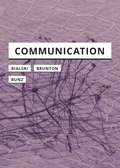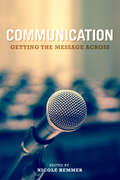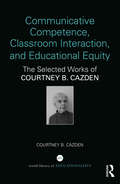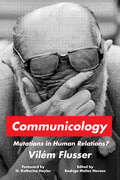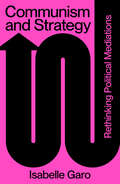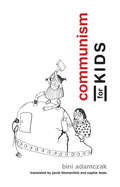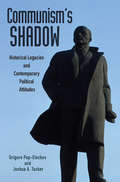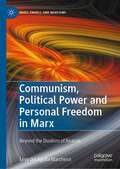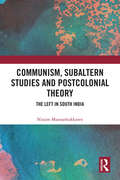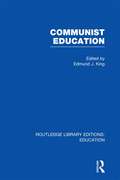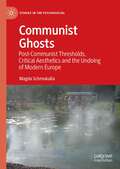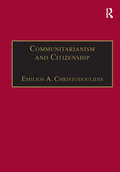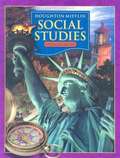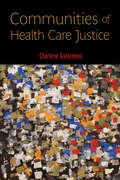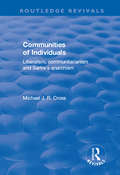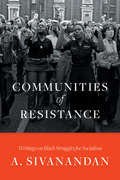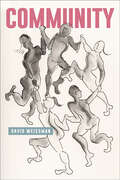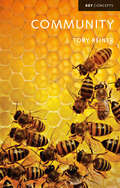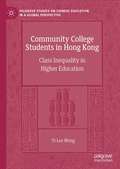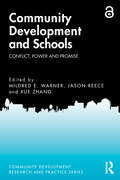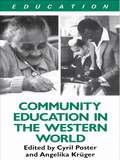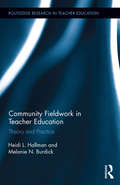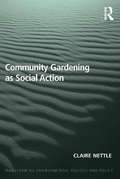- Table View
- List View
Communication and Libertarianism
by Pavel Slutskiy"This is an outstanding contribution to both libertarian political philosophy and communication theory. It is far and away the most comprehensive work on communication issues in libertarian theory ever published. The author has integrated successfully the libertarian insights of Mises, Rothbard, Block, Kinsella and others with the philosophy of language as developed by Austin, Searle and Grice. He has done so in a unique and unprecedented way. The book would appeal to students and scholars interested in libertarian theory and more generally, to philosophers and political scientists interested in high-level scholarship.” - David Gordon, libertarian philosopher and intellectual historian, Ludwig von Mises Institute.
Communication: Essays On Communication, Materiality, And Society (In Search of Media)
by Mercedes Bunz Paula Bialski Finn BruntonOn contemporary communication in its various human and nonhuman formsContemporary communication puts us not only in conversation with one another but also with our machinery. Machine communication—to communicate not just via but also with machines—is therefore the focus of this volume. Diving into digital communications history, Finn Brunton brings to the fore the alienness of computational communication by looking at network timekeeping, automated trolling, and early attempts at communication with extraterrestrial life. Picking up this fascination with inhuman communication, Mercedes Bunz then performs a close reading of interaction design and interfaces to show how technology addresses humans (as very young children). Finally, Paula Bialski shares her findings from a field study of software development, analyzing the communicative forms that occur when code is written by separate people. Today, communication unfolds merely between two or more conscious entities but often includes an invisible third party. Inspired by this drastic shift, this volume uncovers new meanings of what it means &“to communicate.&”
Communication: Getting the Message Across (Miller Center Studies on the Presidency #13)
by Susan J. Douglas David Greenberg Jeff Shesol Mary Kate Cary Anita DunnIn an increasingly polarized political environment, the first year of the new president’s term will be especially challenging. With a fresh mandate, however, the first year also offers opportunities that may never come again. The First Year Project is a fascinating initiative by the Miller Center of the University of Virginia that brings together top scholars on the American presidency and experienced officials to explore the first twelve months of past administrations, and draw practical lessons from that history, as we inaugurate a new president in January 2017.This project is the basis for a new series of digital shorts published as Miller Center Studies on the Presidency. Presented as specially priced collections published exclusively in an ebook format, these timely examinations recognize the experiences of past presidents as an invaluable resource that can edify and instruct the incoming president.Contributors: David Greenberg, Rutgers University * Anita Dunn, former Obama White House Communications Director * Susan Douglas, University of Michigan * Jeff Shesol, former Bill Clinton speechwriter * Mary Kate Cary, former Bush 41 speechwriter
Communicative Competence, Classroom Interaction, and Educational Equity: The Selected Works of Courtney B. Cazden
by Courtney B. CazdenIn the World Library of Educationalists series, international scholars themselves compile career-long collections of what they judge to be their finest pieces—extracts from books, key articles, salient research findings, major theoretical and/or practical contributions—so the world can read them in a single manageable volume. Readers thus are able to follow the themes and strands of their work and see their contribution to the development of a field, as well as the development of the field itself. Contributors to the series include: Michael Apple, James A. Banks, Joel Spring, William F. Pinar, Stephen J. Ball, Elliot Eisner, Howard Gardner, John Gilbert, Ivor F. Goodson, and Peter Jarvis. In this volume, Courtney B. Cazden, renowned educational sociolinguist, brings together a selection of her seminal work, organized around three themes: development of individual communicative competence in both oral and written language and discourse; classroom interaction in learning and teaching; and social justice/educational equity issues in wider contexts beyond the classroom. Since the 1970s, Cazden has been a key figure in the ethnography of schooling, focusing on children’s linguistic development (both oral and written) and the functions of language in formal education, primarily but not exclusively in the United States. Combining her experiences as a former primary schoolteacher with the insight and methodological rigor of a trained ethnographer and linguist, Cazden helped to establish ethnography and discourse analysis as central methodologies for analyzing classroom interaction. This capstone volume highlights her major contributions to the field.
Communicology: Mutations in Human Relations? (Sensing Media: Aesthetics, Philosophy, and Cultures of Media)
by Vilém FlusserCommunicology is Vilém Flusser's first thesis on his concepts of technical images and technical imagination. In this foundational text he lays the groundwork for later work, offering a philosophical approach to communication as a phenomenon that permeates every aspect of human existence. Clearly organized around questions such as "What is Communication?," "What are Codes?," and "What is Technical Imagination?," the work touches on theater, photography, film, television, and more. Originally written in 1978, but only posthumously published in German, the book is one of the clearest statements of Flusser's theory of communication as involving a variably mediated relation between humans and the world. Although Flusser was writing in the 1970s, his work demonstrates a prescience that makes it of significant contemporary interest to scholars in visual culture, art history, media studies, and philosophy.
Communism and Strategy: Rethinking Political Mediations
by Isabelle GaroCommunism is not just a dream of a better world, it is also a theory about how we get thereIf the question of communism is making a comeback today, this renewed interest is often accompanied by an abandonment of any concrete political perspective.Critical philosophies are flourishing and proliferating, but, folded into the academic terrain, they often remain disconnected from the global issues associated with the present crisis of capitalism, contributing, in turn, to the fragmentation of the resistances that are opposed to it.Instead of locking the perspective of emancipation into the registers of utopia, or relegating it to the side of an empty populism, Isabelle Garo studies in this book the conditions of a contemporary revival of the alternative as a collective construction, anchored in real aspirations and struggles and inseparable from a rethinking of the theoretical work.By addressing the impasses faced by many of the most fashionable radical theorists - Badiou, Laclau, the theorists of the commons, and revisiting them in relation to Marx and Gramsci also allows us to re-read the latter from the point of view of contemporary questions of the state and the party, of work and property, of conflict and hegemony.Thus, to rethink strategy is above all to re-explore the question of mediations, whether they be forms of organisation or existing mobilisations, as sites par excellence of political invention.
Communism for Kids (The\mit Press Ser.)
by Bini AdamczakCommunism, capitalism, work, crisis, and the market, described in simple storybook terms and illustrated by drawings of adorable little revolutionaries.Once upon a time, people yearned to be free of the misery of capitalism. How could their dreams come true? This little book proposes a different kind of communism, one that is true to its ideals and free from authoritarianism. Offering relief for many who have been numbed by Marxist exegesis and given headaches by the earnest pompousness of socialist politics, it presents political theory in the simple terms of a children's story, accompanied by illustrations of lovable little revolutionaries experiencing their political awakening.It all unfolds like a story, with jealous princesses, fancy swords, displaced peasants, mean bosses, and tired workers–not to mention a Ouija board, a talking chair, and a big pot called “the state.” Before they know it, readers are learning about the economic history of feudalism, class struggles in capitalism, different ideas of communism, and more. Finally, competition between two factories leads to a crisis that the workers attempt to solve in six different ways (most of them borrowed from historic models of communist or socialist change). Each attempt fails, since true communism is not so easy after all. But it's also not that hard. At last, the people take everything into their own hands and decide for themselves how to continue. Happy ending? Only the future will tell. With an epilogue that goes deeper into the theoretical issues behind the story, this book is perfect for all ages and all who desire a better world.
Communism's Shadow: Historical Legacies and Contemporary Political Attitudes
by Grigore Pop-Eleches Joshua A. TuckerIt has long been assumed that the historical legacy of Soviet Communism would have an important effect on post-communist states. However, prior research has focused primarily on the institutional legacy of communism. Communism's Shadow instead turns the focus to the individuals who inhabit post-communist countries, presenting a rigorous assessment of the legacy of communism on political attitudes.Post-communist citizens hold political, economic, and social opinions that consistently differ from individuals in other countries. Grigore Pop-Eleches and Joshua Tucker introduce two distinct frameworks to explain these differences, the first of which focuses on the effects of living in a post-communist country, and the second on living through communism. Drawing on large-scale research encompassing post-communist states and other countries around the globe, the authors demonstrate that living through communism has a clear, consistent influence on why citizens in post-communist countries are, on average, less supportive of democracy and markets and more supportive of state-provided social welfare. The longer citizens have lived through communism, especially as adults, the greater their support for beliefs associated with communist ideology—the one exception being opinions regarding gender equality.A thorough and nuanced examination of communist legacies' lasting influence on public opinion, Communism's Shadow highlights the ways in which political beliefs can outlast institutional regimes.
Communism, Political Power and Personal Freedom in Marx: Beyond the Dualism of Realms (Marx, Engels, and Marxisms)
by Levy del Aguila MarchenaThis book investigates communism in Marx’s writings, incorporating a consideration of communist politicity. The author outlines the arguments by which it is possible to sustain—from Marx—the idea that human emancipation against capital also means the elimination of the State, the public, and the political dimension of praxis. He also posits that the concrete tasks of the “management of the common” in a communist society require political mediations that allow us to confront the difference inherent to the personality of freely associated producers, as well as the ontological finitude from which no technical power can evade. Finally, assuming Marx as a starting point whose work remains an inescapable source for “thinking communism,” the book proposes a research agenda from Marx and beyond to continue in this imperative task.Levy del Aguila Marchena is Senior Professor and Chair of the Department of Management Sciences at the Pontificia Universidad Católica del Perú. He has published extensively on Marx, political philosophy, and applied ethics.
Communism, Subaltern Studies and Postcolonial Theory: The Left in South India
by Nissim MannathukkarenThis book is a thematic history of the communist movement in Kerala, the first major region (in terms of population) in the world to democratically elect a communist government. It analyzes the nature of the transformation brought about by the communist movement in Kerala, and what its implications could be for other postcolonial societies. The volume engages with the key theoretical concepts in postcolonial theory and Subaltern Studies, and contributes to the debate between Marxism and postcolonial theory, especially its recent articulations. The volume presents a fresh empirical engagement with theoretical critiques of Subaltern Studies and postcolonial theory, in the context of their decades-long scholarship in India. It discusses important thematic moments in Kerala’s communist history which include — the processes by which it established its hegemony, its cultural interventions, the institution of land reforms and workers’ rights, and the democratic decentralization project, and, ultimately, communism’s incomplete national-popular and its massive failures with regard to the caste question. A significant contribution to scholarship on democracy and modernity in the Global South, this volume will be of great interest to scholars and researchers of politics, specifically political theory, democracy and political participation, political sociology, development studies, postcolonial theory, Subaltern Studies, Global South Studies, and South Asia Studies.
Communist Education (Routledge Library Editions: Education)
by Len Barton Martin LawnDevelopments and trends in Communist education are traced in this authoritative survey by specialists. Eight chapters deal with particular aspects: ideology, psychology, the selective process, the roles of teachers and parents, polytechnical education, the universities and professional institutes. Three chapters survey the former East Germany, Poland and China as special case-studies. A concluding chapter examines common ground between Communist and other systems.
Communist Ghosts: Post-Communist Thresholds, Critical Aesthetics and the Undoing of Modern Europe (Studies in the Psychosocial)
by Magda SchmukallaThis book explores post-communist thresholds as materializations of a specific crisis of modern European identity that was caused by the existence and sudden breakdown of Soviet-type communism. It shows how post-communist thresholds emerge where relics from the communist experience continue disrupting the routines and rhythms of a modern life and confront Europeans with cultural experiences, affects and material realities of the ‘enlightened world’ which they usually seek to repress or ignore. In exploring and writing through art projects which engage with the psychosocial fabric of such post-communist thresholds, this book finds ways of speaking and thinking through these transitory and paradox sites, and asks what we can say about other or new worlds, about new beginnings and endings as well as about decolonial and ethical ways of relating to the other when assessing the status quo of European modernity from within its liminal and crisis-driven sphere.
Communitarianism and Citizenship (ALSP series in conjunction with The Association for Legal and Social Philosophy)
by Emilios A. ChristodoulidisThis book is volume three in the series and is the edited proceedings of the 1997 ALSP conference. The conference covered issues relating to Communitarianism and citizenship from socio-legal, philosophical and political perspectives. The papers are a collection drawn from international authors covering a wide variety of subjects such as tolerance, social citizenship and social rights in a global context.
Communities
by Herman J. Viola Sarah Witham Bednarz Mark C. Schug Charles S. White Maryellen Vogt Cheryl Jennings Dolores Beltra Carlos E. CortésNIMAC-sourced textbook
Communities
by Herman J. Viola Sarah Witham Bednarz Mark C. Schug Charles S. White Maryellen Vogt Cheryl Jennings Dolores Beltra Carlos E. CortésNIMAC-sourced textbook
Communities of Health Care Justice
by Charlene GalarneauThe factions debating health care reform in the United States have gravitated toward one of two positions: that just health care is an individual responsibility or that it must be regarded as a national concern. Both arguments overlook a third possibility: that justice in health care is multilayered and requires the participation of multiple and diverse communities. Communities of Health Care Justice makes a powerful ethical argument for treating communities as critical moral actors that play key roles in defining and upholding just health policy. Drawing together the key community dimensions of health care, and demonstrating their neglect in most prominent theories of health care justice, Charlene Galarneau postulates the ethical norms of community justice. In the process, she proposes that while the subnational communities of health care justice are defined by shared place, including those bound by culture, religion, gender, and race that together they define justice. As she constructs her innovative theorization of health care justice, Galarneau also reveals its firm grounding in the work of real-world health policy and community advocates. Communities of Health Care Justice not only strives to imagine a new framework of just health care, but also to show how elements of this framework exist in current health policy, and to outline the systemic, conceptual, and structural changes required to put these justice norms into fuller practice.
Communities of Individuals: Liberalism, Communitarianism and Sartre's Anarchism (Routledge Revivals)
by Michael J. CrossThis title was first published in 2001: This book examines the liberal-communitarian debate from a new perspective. Communitarians argue that liberal theory neglects the significance of communities for the lives of their members. An examination of that argument reveals that there are deficiencies in the communitarian account of community. Identifying and remedying those deficiencies is the key concern of this book. Uniquely, this book addresses the deficiencies using Sartre's anarchist theory derived largely but not exclusively from an interpretation of the Critique of Dialectical Reason. Sartre champions the individual yet criticises liberalism. The tension arising from these two apparently disparate positions makes for a fruitful argument, enhanced by the connections made with Aristotelian and feminist theory, Hobbes and Rousseau. Finally, a method is developed for inquiring into the nature of associations which, it is argued, should interest communitarians concerned to avoid deficiencies in their account of community.
Communities of Resistance: Writings on Black Struggles for Socialism
by A. Sivanandan&‘There is no socialism after liberation, socialism is the process through which liberation is won.&’ Each of the essays in Communities of Resistance acts as a critical reaffirmation of socialist politics as the context for questions of race and resistance.The left itself is under scrutiny here—from a black perspective. A series of powerful interventions covers many of the issues which have confronted radical politics in the 1980s: inner-city uprisings, the demand for black sections in the Labour Party, local government anti-racism, the move to a common European market. This collection included incisive critiques of contemporary Marxism (&‘All that Melts into Air is Solid: The Hokum of &“New Times&” &’), of post-colonial development, and of the Eurocentric assessment of imperialism.
Community
by David WeissmanCommunities are vital to personal and social well-being because collaboration is required where skills and resources are scarce; their pathologies—anonymity and isolation, tribalism and murder—defeat us.Community is often invoked respectfully but without a clear referent. The word is said to be used ninety-four ways, evidence that its sense is diffuse. Community clarifies the word's principal expressions and the alternative ideological spaces-holistic and hierarchical or open and tolerant-in which communities form. Members bind in the interest of utility-jobs or schools-or because home and friendship are the focus of feeling and significance. These binders are social glue: they explain our dedication to communal aims and loyalty to fellow members. Autonomy in their context is socialized; its bases are the information, attitudes, and skills acquired when families and schools prepare us for roles in communities inherited or chosen. Yet community is fraught. Holistic societies are repressive; open societies are vulnerable. The members of successful communities-families, businesses, and schools-often thrive. Those excluded for want of luck or skill are abandoned and anonymous. Their isolation is one of an open society's two pathologies: collaboration is a social necessity when resources, space, and skills are scarce; competition turned visceral and murderous is a vice.
Community (Key Concepts)
by J. Toby ReinerPeople often yearn for a sense of belonging and connection: they long to live in a meaningful community. In the modern age, however, this often seems to be a chimera. Does modernity doom us to be atomised individuals? Does the promise of community imply a loss of autonomy and freedom and entrench inequality and hierarchy? In this book, J. Toby Reiner examines the debates surrounding community in modern political and social thought. He outlines how liberals, conservatives, socialists, and nationalists have historically conceived of the ties that bind together political communities, and how recent political philosophers such as Rawls, Taylor, Walzer, and Sandel have debated the nature and merits of community in the contemporary world. He goes on to consider how prominent conceptions of community relate to and are in tension with characteristically modern ideals such as equality and freedom. He deftly shows how a meaningful conception of community can be reconciled with the demands of modern liberal societies. Filled with real-life examples and thought-provoking discussions of the key debates, this book will be essential reading for students of contemporary political theory and philosophy and of sociology.
Community College Students in Hong Kong: Class Inequality in Higher Education (Palgrave Studies on Chinese Education in a Global Perspective)
by Yi-Lee WongThis book presents a comprehensive account of the educational experiences of community college students in Hong Kong, analyzed through a theoretical lens that intersects sociological theories of inequality, including Bourdieu's concept of cultural capital. The student narratives featured in this book reveal the interweaving personal, academic, and professional considerations and challenges affecting their individual choices in the pursuit of higher education. Chapters also reveal why, despite the relative expansion of educational opportunities, the class gap in higher education persists.
Community Development and Schools: Conflict, Power and Promise (ISSN)
by Mildred E. Warner Xue Zhang Jason ReeceThis book lays out the promise and potential of schools as community-building institutions. It explores the challenges faced in incorporating schools into broader community development policy, and also recognizes the changing demographics of schools and their need to integrate with economic development policy in order to promote broader community development.The book includes chapters on tax abatements and economic development policy impacts on schools, new approaches to school building renovation, the potential and reach of shared services between communities and schools, and the impact of school-based health centers. It also offers a theory to integrate schools into community development. Key elements include shared power between communities and schools, greater transparency in economic development policy, collaboration across the broad range of community actors, and engagement of diverse voices. These elements build a greater sense of belonging across generations and class and racial divides.Creative democracy can broaden both school and community development agendas and build a culture of health. This book will help community development and school leaders recognize and pursue the promise of schools as critical community development actors.The Open Access version of this book, available at http://www.taylorfrancis.com, has been made available under a Creative Commons Attribution-Non Commercial (CC-BY-NC) 4.0 license.
Community Education and the Western World
by Angelika Krüger Cyril PosterFirst published in 1990. Routledge is an imprint of Taylor & Francis, an informa company.
Community Fieldwork in Teacher Education: Theory and Practice (Routledge Research in Teacher Education)
by Heidi L Hallman Melanie BurdickIn teacher education, field work in community-based spaces (including foster homes and programs for homeless youth) is frequently contrasted with "traditional" field experiences in classroom settings, where beginning teachers are immediately introduced to teacher-centered models of instruction. This volume works against such a model, presenting a counter-narrative of new teachers’ understanding of the act of teaching. By exploring their work with at risk youth in community-based sites, the authors uncover how non-traditional spaces for teaching and learning have the potential to open new doors for reimagining the teaching act and teacher identity. This volume examines how prospective teachers have used writing within unconventional spaces as catalysts for considering what it means to become a teacher, as well as how the work of teaching can be conceptualized. It unites the practical aspects of field work and with theoretical conceptions of teaching, and envisions how the work and the definition of "teaching" can be broadened.
Community Gardening as Social Action (Transforming Environmental Politics and Policy #2)
by Claire NettleThere has been a resurgence of community gardening over the past decade with a wide range of actors seeking to get involved, from health agencies aiming to increase fruit and vegetable consumption to radical social movements searching for symbols of non-capitalist ways of relating and occupying space. Community gardens have become a focal point for local activism in which people are working to contribute to food security, question the erosion of public space, conserve and improve urban environments, develop technologies of sustainable food production, foster community engagement and create neighbourhood solidarity. Drawing on in-depth case studies and social movement theory, Claire Nettle provides a new empirical and theoretical understanding of community gardening as a site of collective social action. This provides not only a more nuanced and complete understanding of community gardening, but also highlights its potential challenges to notions of activism, community, democracy and culture.
